 Petzlover
Petzlover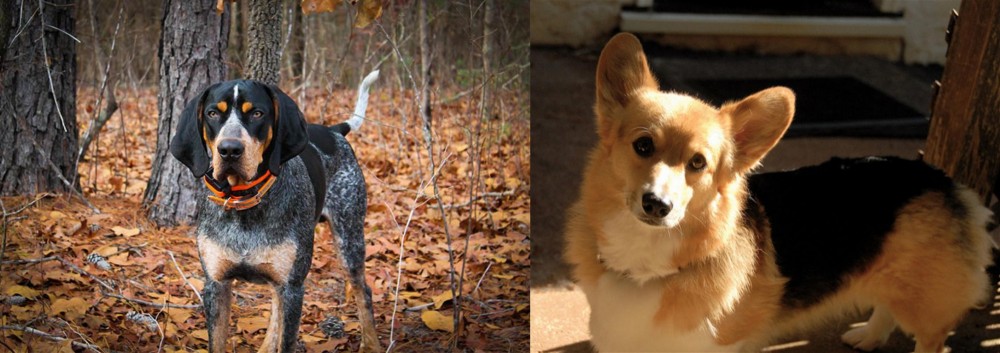 Bluetick Coonhound is originated from United States but Dorgi is originated from United Kingdom. Bluetick Coonhound may grow 39 cm / 16 inches higher than Dorgi. Bluetick Coonhound may weigh 24 kg / 53 pounds more than Dorgi. Bluetick Coonhound may live 3 years less than Dorgi. Both Bluetick Coonhound and Dorgi has almost same litter size. Bluetick Coonhound requires Moderate Maintenance. But Dorgi requires Low Maintenance
Bluetick Coonhound is originated from United States but Dorgi is originated from United Kingdom. Bluetick Coonhound may grow 39 cm / 16 inches higher than Dorgi. Bluetick Coonhound may weigh 24 kg / 53 pounds more than Dorgi. Bluetick Coonhound may live 3 years less than Dorgi. Both Bluetick Coonhound and Dorgi has almost same litter size. Bluetick Coonhound requires Moderate Maintenance. But Dorgi requires Low Maintenance
 Bred to be hunting dogs, for a long time the Bluetick Coonhound was referred to as the English Coonhound.The Bluetick Coonhound is actually one of 6 recognized breeds of Coonhound, and they were all developed in the United States. In 1945, breeders broke away from their English counterparts, renaming the larger dog to Bluetick Coonhound.
Bred to be hunting dogs, for a long time the Bluetick Coonhound was referred to as the English Coonhound.The Bluetick Coonhound is actually one of 6 recognized breeds of Coonhound, and they were all developed in the United States. In 1945, breeders broke away from their English counterparts, renaming the larger dog to Bluetick Coonhound.
Not much is known of their origins but it seems as though with selective breeding between French Hounds, Foxhounds and English Coonhounds, the Bluetick Coonhound was produced. Originating in the United States of America, it was in 2008 that he Bluetick Coonhound was recognized by the AKC in the Miscellaneous Class.
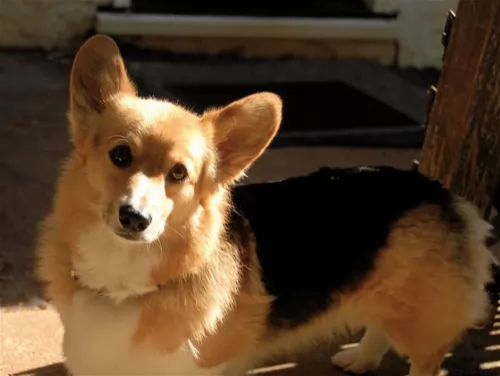 The Dorgi is a designer crossbreed whose origins are not entirely known, however it is a popular breed, being a mix between a Dachshund and a Pembroke Welsh Corgi.
The Dorgi is a designer crossbreed whose origins are not entirely known, however it is a popular breed, being a mix between a Dachshund and a Pembroke Welsh Corgi.
The Dorgi itself is new breed and therefore has a short history, but both dogs used to develop the Dorgi – the Dachshund and the Corgi – have their own unique histories.
The Dachshund originated in Germany in the 1500s and the Pembroke Welsh Corgi originated in the United Kingdom centuries ago.
 This is a medium to large dog that sports a dark blue and white coat which is densely mottled or ticked. The Bluetick Coonhound’s coat can be described as tri-colored, and the dog’s head and ears are essentially black. He can also have tan markings on the chest, below the tail, around the muzzle and over the eyes. The dog is muscular and athletic and weighs from 25 to 36kg. Typically of the Hound breed, he has a sad but amicable expression on his face.
This is a medium to large dog that sports a dark blue and white coat which is densely mottled or ticked. The Bluetick Coonhound’s coat can be described as tri-colored, and the dog’s head and ears are essentially black. He can also have tan markings on the chest, below the tail, around the muzzle and over the eyes. The dog is muscular and athletic and weighs from 25 to 36kg. Typically of the Hound breed, he has a sad but amicable expression on his face.
The Bluetick Coonhound is an intelligent dog and once he has been trained and socialized, he becomes a wonderful member of the family, getting on well with children and other pets He will need plenty of companionship from his human family as well as exercise, and isn’t a dog that you can just have stuck away in your back garden. A Bluetick needs plenty of companionship and activity to be happy.
Friendly and social, this is a vocal dog, given to baying, barking and howling. He’s a scenthound, so when you take him for a walk, which is essential for his exercise needs, you may need him on a leash as he can get scent of something and just be off. You’ll also need to ensure you have a fenced yard as he looks for ways to get out to follow a scent.
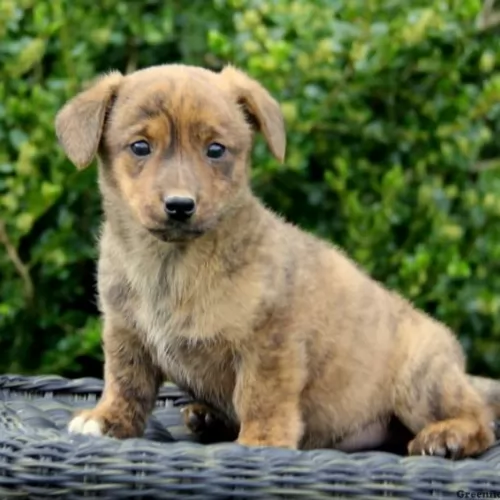 The Dorgi is known for his long body, short legs and the erect ears of the corgi. He is a small dog, measuring roughly 20-30cm in height and weighing in the region of 6 – 12kg.
The Dorgi is known for his long body, short legs and the erect ears of the corgi. He is a small dog, measuring roughly 20-30cm in height and weighing in the region of 6 – 12kg.
Many people also refer to him as the sausage dog. The look of your Dorgi can depend quite a bit on whether he looks more like a Corgi or a Dachshund, so for instance the coat can be short and smooth, or thick and coarse.
They can surprise you with their looks, and some are born with long tails while others are born with bobtails. The coat comes in many colors too, from tan to brown to black and white or a mixture of these colors.
The Dorgi is full of the joys of life, just loving all the attention he gets from his human family. Of course, in return for this affection, he offers love, loyalty and plenty of fun and games.
He is an energetic breed too and is always ready to join in any games with the children in the home as well as with cats and dogs living in the home too.
Training and socialization will also be needed for the Dorgi who is intelligent and easy to train. He has wonderful behavior when trained, being obedient and relaxed around visitors to your home.
Social and sweet, this is one little dog who is guaranteed to make a wonderful pet and companion, as he loves human companionship and never wants to be left alone for too long. He is alert too, so while he is small and no real threat to an intruder, he is willing to do what it takes to protect his human family and to bark to alert you.
 The Bluetick Coonhound is an affectionate dog who will do well in the country, although he will adapt to city dwelling too. Wherever he is, he will need plenty of activities to keep him busy.
The Bluetick Coonhound is an affectionate dog who will do well in the country, although he will adapt to city dwelling too. Wherever he is, he will need plenty of activities to keep him busy.
People living on smaller properties may have reservations about keeping one, as his bark is loud and long winded, whereas a larger property would accommodate this characteristic better.
Your Bluetick can make a wonderful pet if he is trained and socialized. He is just like a big teddy bear who wants to be part of the family and receive his full portion of love and care like everyone else.
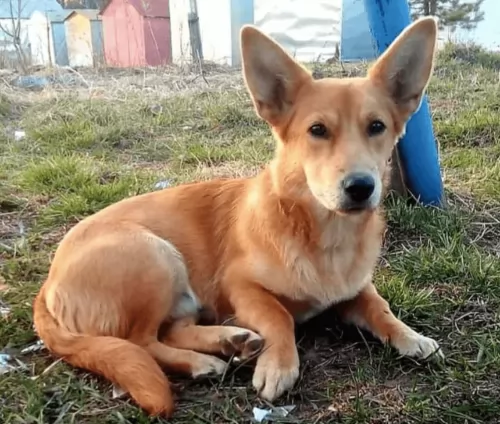 The Dorgi is such a sweet little designer breed of dog that happens to also be low maintenance. Apart from being a little dog full of energy and attitude, he is loving and loyal as a family pet too, being gentle around children and making a splendid pet.
The Dorgi is such a sweet little designer breed of dog that happens to also be low maintenance. Apart from being a little dog full of energy and attitude, he is loving and loyal as a family pet too, being gentle around children and making a splendid pet.
He isn’t going to eat you out of hearth and home either and he is a fairly healthy breed as well.
When you bring a Dorgi into your home, you’re bringing in a whole lot of happiness as he is an awesome family member who wants to be counted in on everything the do.
 You won’t battle with too many vet’s fees for your Bluetick Coonhound as he is a healthy breed. Just like with other dogs, especially in larger dogs, watch out for hip and elbow dysplasia.
You won’t battle with too many vet’s fees for your Bluetick Coonhound as he is a healthy breed. Just like with other dogs, especially in larger dogs, watch out for hip and elbow dysplasia.
If you do research you’ll find that quite a few Coonhounds can be affected. It is when the hip or elbow socket is malformed. Check your pet because it can lead to painful arthritis and can cause lameness.
Typical of Hounds, your Bluetick Coonhounds loves to eat, and this is precisely why he is prone to over-eating if you allow him to. Watch your dog’s weight and don’t allow him to overeat as overeating suppresses the immune system, resulting in illness.
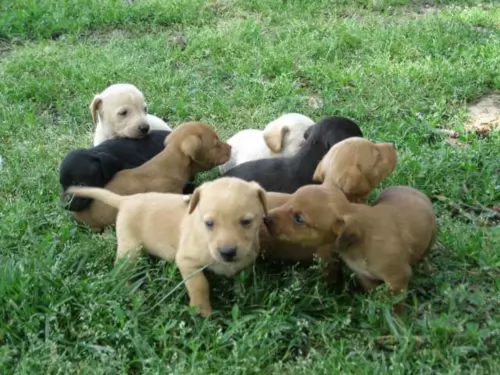 Because the Dorgi is a hybrid breed, he promises to be quite healthy, but on the other hand, it could be that he inherits some of the common health problems associated with either the Corgi or the Dachshund.
Because the Dorgi is a hybrid breed, he promises to be quite healthy, but on the other hand, it could be that he inherits some of the common health problems associated with either the Corgi or the Dachshund.
Obesity is always a problem with a small dog, as they’re so sweet, you just want to be popping treats into their mouths all the time. It is important to follow a healthy diet for your pet however if you want to stave off common dog disorders.
An obese dog faces a shorter life expectancy, and some of the major health issues that an obese Dorgi has to contend with is diabetes, osteoarthritis, high blood pressure and cancer among others. Certainly better, healthier pet food choices can help save you money on vets fees.
Diabetes in canines is just as serious as in humans and its a glucose-insulin complication where the pancreas isn’t producing enough insulin.
Sugars build-up in the blood and these can cause damage to your dog’s eyes, heart and kidneys. You may notice your pet gaining weight, being more thirsty, being tired and having cloudy eyes which could be indicative of cataracts. Take your pet to the vet as insulin shots may be required.
 The puppy Bluetick will require 4 meals a day. Your adult Bluetick will require one or two bowls of food a day. This food can be your own home-made brand which includes rice, meat and vegetables or it should be a high quality commercially manufactured dog food. If you’re in any doubt as to what kind of dog food to be providing for your Bluetick Coonhound, rather speak to your vet as you want to ensure your pet is getting in his vitamins and minerals.
The puppy Bluetick will require 4 meals a day. Your adult Bluetick will require one or two bowls of food a day. This food can be your own home-made brand which includes rice, meat and vegetables or it should be a high quality commercially manufactured dog food. If you’re in any doubt as to what kind of dog food to be providing for your Bluetick Coonhound, rather speak to your vet as you want to ensure your pet is getting in his vitamins and minerals.
Good nutrition is essential to the health and wellbeing of your dog. It is important that he receive raw meat in his diet from time to time as well as a supplement with essential fatty acids to keep his health and skin in tip top condition. He should never ever be without a steady source of fresh, cool water.
When it comes to grooming, an occasional brushing will suffice. The dog has a short coat but it is dense and it sheds throughout the year. Use a brush on him to get rid of loose hairs and to keep his coat soft and shiny.
Active Hound breeds are prone to ticks and fleas so check your dog regularly for these parasites.
The medium length floppy ears will need to be checked. You can always check with your veterinarian for ear cleaning products and how to use them. Never prod around in your dog’s ears, trying to clean them, as this can lead to damage.
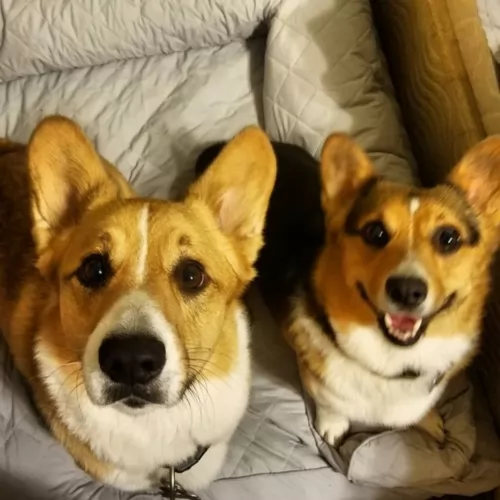 Your Dorgi’s coat will be shortish, and shedding is minimal so a good brush twice a week will be perfect for this pet of yours, and he will love the attention you give him while doing so.
Your Dorgi’s coat will be shortish, and shedding is minimal so a good brush twice a week will be perfect for this pet of yours, and he will love the attention you give him while doing so.
He is an active breed so he will require regular exercise. Take him with you on your walks. Even if you have a small garden, he’ll love fetching a ball for you.
If you give your Dorgi commercially manufactured dog food, remember to be guided by the feeding recommendations to avoid obesity.
Its always a good idea to add in some raw meat to his diet to keep his nose wet and his skin free from being dry and itchy. You can also add in some cooked brown rice, vegetables and chicken for variety.
Always ensure that a bowl of fresh water is constantly available.